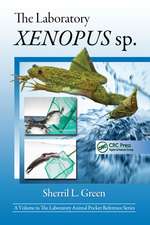Chembiomolecular Science: At the Frontier of Chemistry and Biology
Editat de Masakatsu Shibasaki, Masamitsu Iino, Hiroyuki Osadaen Limba Engleză Hardback – 2 oct 2012
| Toate formatele și edițiile | Preț | Express |
|---|---|---|
| Paperback (1) | 1039.19 lei 39-44 zile | |
| Springer – 22 aug 2016 | 1039.19 lei 39-44 zile | |
| Hardback (1) | 1229.10 lei 6-8 săpt. | |
| Springer – 2 oct 2012 | 1229.10 lei 6-8 săpt. |
Preț: 1229.10 lei
Preț vechi: 1498.90 lei
-18% Nou
Puncte Express: 1844
Preț estimativ în valută:
235.19€ • 245.07$ • 194.73£
235.19€ • 245.07$ • 194.73£
Carte tipărită la comandă
Livrare economică 03-17 aprilie
Preluare comenzi: 021 569.72.76
Specificații
ISBN-13: 9784431540373
ISBN-10: 4431540377
Pagini: 344
Ilustrații: XVI, 325 p.
Dimensiuni: 155 x 235 x 24 mm
Greutate: 0.77 kg
Ediția:2012
Editura: Springer
Colecția Springer
Locul publicării:Tokyo, Japan
ISBN-10: 4431540377
Pagini: 344
Ilustrații: XVI, 325 p.
Dimensiuni: 155 x 235 x 24 mm
Greutate: 0.77 kg
Ediția:2012
Editura: Springer
Colecția Springer
Locul publicării:Tokyo, Japan
Public țintă
ResearchCuprins
Part 1 Chembiomolecular Chemistry. Chemistry of Mycolactones, the Causative Toxins of Buruli Ulcer.- Practical Synthesis of Tamiflu and Beyond.- An Approach Toward Identification of Target Proteins of Maitotoxin Based on Organic Synthesis.- Inhibitors of Fatty Acid Amide Hydrolase.- Small Molecule Tools for Cell Biology and Cell Therapy.- Toward the Discovery of Small Molecules Affecting RNA Function.- New Insights from a Focused Library Approach Aiming at Development of Inhibitors of Dual-Specificity Protein Phosphatases.- The Deep Oceans as a Source for New Treatments for Cancer.- Search for New Medicinal Seeds from Marine Organisms.- Identification of Protein–Small Molecule Interactions by Chemical Array.- Part 2 Chembiomolecular Biology. Small Molecule-Induced Proximity.- High-Throughput Screening for Small Molecule Modulators of FGFR2-IIIb Pre-mRNA Splicing.- Identification of Signaling Pathways That Mediate Dietary Restriction-Induced Longevity in Caenorhabditis elegans.- Roles for the Stress-Responsive Kinases ASK1 and ASK2 in Tumorigenesis.- Tailored Synthetic Surfaces to Control Human Pluripotent Stem Cell Self-Renewal.- Cell-Surface Glycoconjugates Controlling Human T-Lymphocyte Homing: Implications for Bronchial Asthma and Atopic Dermatitis.- Establishment of a Novel System for Studying the Syk Function in B Cells.- Visual Screening for the Natural Compounds That Affect the Formation of Nuclear Structures.- Versatile Orphan Nuclear Receptor NR4A2 as a Promising Molecular Target for Multiple Sclerosis and Other Autoimmune Diseases.- Antiviral MicroRNA. - Synaptic Function Monitored Using Chemobiomolecular Indicators.- Part 3 Chembiomolecular Medicinal Chemistry. Practical Catalytic Asymmetric Synthesis of a Promising Drug Candidate.- Hunting the Targets of Natural Product-Inspired Compounds.- Chemical Approaches for Understanding and Controlling Infectious Diseases.- Nongenomic Mechanism-Mediated Renal Fibrosis-Decreasing Activity of a Series of PPAR-g Agonists.- Novel Carbohydrate-Based Inhibitors That Target Influenza A Virus Sialidase.- Multidrug Efflux Pumps and Development of Therapeutic Strategies to Control Infectious Diseases.- Enzymes as Chemotherapeutic Agents.- Mechanism of Action of New Antiinfectious Agents from Microorganisms.- Correction of RNA Splicing with Antisense Oligonucleotides as a Therapeutic Strategy for a Neurodegenerative Disease.- Modulation of Pre-mRNA Splicing Patterns with Synthetic Chemicals and Their Clinical Applications.
Textul de pe ultima copertă
At the forefront of life sciences today is the emerging discipline of chembiomolecular science. This new term describes the integration of the frontier fields of chemical biology, chemistry, and pharmacology. Chembiomolecular science aims to elucidate new biological mechanisms as potential drug targets and enhance the creation of new drug therapies. This book comprises the proceedings of the Uehara Memorial Foundation Symposium 2011, which focused on the most recent advances in chembiomolecular science made by leading experts in the field. The book is divided into three main topics. The first is the chemical approach to understanding complex biological systems on a molecular level using chemical compounds as a probe. The second describes the biological approach used to develop new lead drug compounds. The third focuses on the biological system that serves as the potential drug target, the beginning step in the process of developing new drugs. Replete with the latest research, the book will draw the attention of all scientists interested in the synergies between chemistry and biology to elucidate life on a molecular level and to promote drug discovery. Ultimately, the book helps promote the understanding of biological functions at the molecular level and create new pharmaceuticals that can contribute to improving human health.
Caracteristici
Elucidates new biological mechanisms as potential drug targets
Provides new insights from the frontiers of research in biology and chemistry
Promotes development of new drug therapies to improve human health
Provides new insights from the frontiers of research in biology and chemistry
Promotes development of new drug therapies to improve human health











